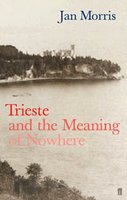Melancholy is Trieste's chief rapture. In almost everything I read about this city, by writers down the centuries, melancholy is evoked. It is not a stabbing sort of disconsolation, the sort that makes you pine for death (Although Trieste's suicide rate, as a matter of fact, is notoriously high.) In my own experience it is more like our Welsh hiraeth, expressing itself in bitter-sweetness and a yearning for we know not what.

By Jan Morris
Published by Faber & Faber
When I found out Jan Morris turns 80 this October I decided I have to pick up Trieste before - well, before anything permanent happens to her. Okay, it's a morbid thought. But as soon as I finished the final pages of The Master and Margarita, I picked up Trieste. And that was 3 am in the morning.
I have always wanted to read Jan Morris, but -->insert excuses here<-- Excuses aside, I've since set down Trieste and the Meaning of Nowhere as the first Jan Morris book to read. Really.
Trieste was said to be her last book. Thankfully, that has been proven to be just an unfounded rumour since the publication of Morris' novel, Hav, in 2006.
What do I know about Trieste? Very little. I happen to know James Joyce lived there for a while, and he taught English to a middle-aged Triestino gentleman who will one day be know as Italo Svevo. Otherwise, nothing at all.
Why does Jan Morris come back to this dead seaport that lies in limbo - officially a part of Italy - yet according to a poll in 1999, 70 percent of the Italian people have no idea Trieste actually belongs to Italy.
Jan Morris first came to Trieste as a young man. It was at the end of the Second World War, and James Morris was a soldier in Her Majesty's service. Decades later, after her gender-reassignation surgery, she returns to Trieste, the city that is for her, "an allegory of limbo."
"My acquaintance with the city spans the whole of my adult life," she writes, "but like my life it still gives me a waiting feeling, as if something big but unspecified is always about to happen.”
Trieste is a place sympathetic to Jan Morris's heart. She tells us of listening to Signor Umberto Lupi, a famous Trieste artist who sang in the Trieste dialect. He is of a certain age himself, and his audience elderly. As Signor Lupi sang his sweet songs, in their language, the eyes of his audience were full of tears. Jan Morris wept with them. Because she knows the songs will not last much longer, because she is at an age where you realise the best years of your life is behind you, and what is to come, dark. This is the state of unease, where you have not yet resigned from life, yet aware of the inescapable decline. Like Trieste, Jan Morris faces these questions: where do you belong in the world? Where do you go from here?
I am homesick, I am thinking sad thoughts about age, doubt and disillusion, but I am not unhappy. I feel there are good people around, and an unspecified yearning steals narcotically over me - what the Welsh call hiraeth. Pathos is part of it, but in a lyrical form to which I am sentimentally susceptible, and at the same time I am excited by a suggestion of sensual desire. The allure of lost consequence and faded power is seducing me, the passing of time, the passing of friends, the scrapping of great ships! In sum, I feel that this opaque seaport of my vision, so full of sweet melancholy, illustrates not just my adolescent emotions of the past, but my life-long preoccupations too. The Trieste effect, I call it. It is as though I have been taken, for a brief sententious glimpse, out of time to nowhere.
No comments:
Post a Comment